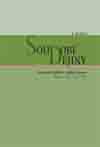Proč studená válka trvala tak dlouho?
Why Did the Cold War Last So Long?
Author(s): Mark KramerSubject(s): History
Published by: AV ČR - Akademie věd České republiky - Ústav pro soudobé dějiny
Summary/Abstract: The Cold War remains one of the most important phenomena in the post-World-War-II era. The conflict, which, according to Mark Kramer, is distinguished from other conflicts and other periods of modern history by a ‘fundamental clash of ideologies’ and a ‘highly stratified global power structure’, still raises many questions, which remain to be answered. One of these questions, addressed by Kramer in his article, is whether the Cold War could have ended earlier than in the late 1980s/early 1990s. It would have seemed that there were ‘windows of opportunity’ on several occasions before when both superpowers could have achieved a signifi cant improvement in their mutual relationship and thus could help to ease the tensions on the global level. The author’s primary objective is not, however, to try to provide an answer to the question stated in the previous article. He instead focuses on examining how different theoretical concepts could be used to aid the Cold War research. As a model example, Kramer has chosen to compare the situation in the Soviet Union and the Eastern bloc in general in 1953, after Stalin’s death, and in 1987–1989, under Gorbachev’s leadership. He applies three different theoretical premises: ‘internalization and the shaping of policy preferences’; ‘double-edged diplomacy and highly unequal relationships’; and ‘new ideas and the sources of policy changes’. Kramer convincingly argues that none of these approaches, taken just by themselves, could satisfactorily explain the developments in the Soviet Union and the internal-external linkages in the relations between Moscow and the countries of East-Central Europe in the time periods studied. He shows, however, that in a slightly modifi ed version, the concepts can be used to highlight particular aspects of the problem, which could otherwise be overlooked. For this reason, these theoretical frameworks should be taken into account when conducting research of the Cold War period.
Journal: Soudobé Dějiny
- Issue Year: XVIII/2011
- Issue No: 01-02
- Page Range: 172-195
- Page Count: 24
- Language: Czech

